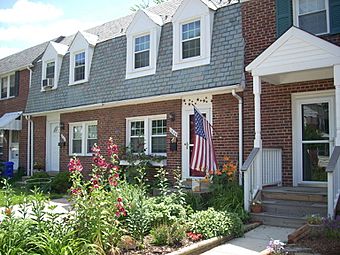Monroe Courts Historic District facts for kids
|
Monroe Courts Historic District
|
|

Monroe Courts, June 2009
|
|
| Location | Bounded by 10th St N, N. Monroe St., Washington Blvd. and N. Nelson St., Arlington, Virginia |
|---|---|
| Area | 2.4 acres (0.97 ha) |
| Built | 1938 |
| Architect | Cobb, John D.; Gosnell, Clarence W. |
| Architectural style | Colonial Revival |
| MPS | Historic Residential Suburbs in the United States, 1830-1960 MPS |
| NRHP reference No. | 08000064 |
Quick facts for kids Significant dates |
|
| Added to NRHP | February 21, 2008 |
The Monroe Courts Historic District is a special neighborhood in Arlington County, Virginia. It's recognized as a historic district, which means it has important buildings that tell a story about the past. This district includes 39 buildings that were all built in 1938.
These buildings are mostly two-story rowhouses. A rowhouse is a home that shares walls with the houses next to it, forming a long row. They were designed in a style called Colonial Revival. This style looks back to the architecture of early American homes. The Monroe Courts homes were built for middle-class families. These families were moving to Arlington because it was a fast-growing area near Washington, D.C.. Many people worked in D.C. and lived in Arlington.
The Monroe Courts Historic District was added to the National Register of Historic Places in 2004. This listing helps protect the neighborhood's unique history and architecture.
Contents
What is a Historic District?
A historic district is an area that has a group of buildings, structures, or objects that are important because of their history, architecture, or culture. These districts are often protected to keep their special character.
Why Are Districts Important?
- Preserving History: They help us remember how people lived long ago.
- Architectural Styles: They show us different building styles from the past.
- Community Identity: They give a neighborhood a unique feel and story.
When a place becomes a historic district, it means it's worth saving for future generations.
The Homes of Monroe Courts
The homes in Monroe Courts are a great example of 1930s architecture. They were built during a time when many people were moving to suburbs.
Rowhouse Design
The houses are mostly rowhouses. This design was popular for a few reasons:
- Space Saving: They fit many homes into a smaller area.
- Affordable: They were often more affordable than detached houses.
- Community Feel: Living close together could create a strong neighborhood.
Each home usually has two stories and two bays. A "bay" refers to a section of the building, often marked by windows or doors.
Colonial Revival Style
The Colonial Revival style became popular in the late 1800s and early 1900s. It brought back elements from the colonial period.
- Simple Shapes: Buildings often have clean, simple lines.
- Classic Details: You might see features like columns or symmetrical windows.
- Brick or Wood: Many homes use traditional materials like brick.
This style made the new homes feel familiar and classic, even though they were modern for their time.
Why Was Monroe Courts Built?
Monroe Courts was built in 1938. This was a time of big changes in the United States.
Growth of Suburbs
After the Great Depression, the economy was starting to recover. Many people were looking for new homes. Cities like Washington, D.C., were growing, and people needed places to live nearby.
- Commuting: Cars were becoming more common. This made it easier for people to live outside the city and drive to work.
- New Opportunities: Arlington became a popular place for people who worked in D.C. but wanted more space or a quieter neighborhood.
Monroe Courts offered modern, comfortable homes for these families.
Protecting Monroe Courts' History
Being listed on the National Register of Historic Places is a big deal. It means the Monroe Courts Historic District is recognized nationally for its importance.
What Does Listing Mean?
- Recognition: It highlights the district's historical and architectural value.
- Protection: It can help protect the buildings from changes that would harm their historic look.
- Awareness: It makes people more aware of the special history in their own communities.
The listing helps ensure that future generations can also appreciate the unique story of Monroe Courts.




